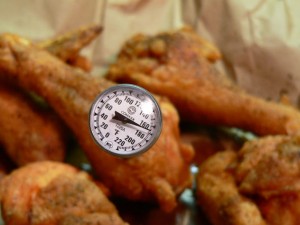Tennessee State and Kansas State Universities collaborate on poultry and egg preparation study
NASHVILLE, Tenn. (TSU News Service) – According to a recent study, many consumers are putting themselves at risk for a foodborne illness when preparing poultry and eggs. The study, conducted between Tennessee State University and Kansas State University, examined how and with what degree of accuracy consumers determined doneness when preparing these items.
While many of the foods in the study were cooked to a safe temperature, those cooked below recommended temperatures were cause for concern. Only a small number of participants used cooking thermometers to determine doneness in the poultry items, and most of those used them incorrectly.

“There is only one way to determine if your poultry and eggs are cooked to a safe temperature, and that is to use a thermometer,” said Dr. Sandria Godwin, TSU principal researcher on the study. “It is recommended that poultry be cooked to a temperature of 165 F and eggs and foods containing eggs to a temperature of 160 F, with the thermometer inserted into the thickest part of the egg or poultry.”
Godwin also cautioned against some of the widely embraced, less accurate methods of determining doneness, noting that the absence of pink areas in poultry is not necessarily an indication that it is safe to eat.
 “This is like driving your car and assuming you are going the right speed,” she said. “You may not be right and the only way to check is to look at the speedometer. Sometimes you are correct, but occasionally you are wrong and tickets, accidents, or worse can happen.”
“This is like driving your car and assuming you are going the right speed,” she said. “You may not be right and the only way to check is to look at the speedometer. Sometimes you are correct, but occasionally you are wrong and tickets, accidents, or worse can happen.”
Unfortunately, while nearly all cars have working speedometers built-in, many of us may find ourselves cooking without the benefit of a thermometer nearby. In this scenario, Godwin recommends a ‘better safe than sorry’ approach.
“If you cannot use a thermometer it is recommended that the eggs are cooked until both the yolks and whites are firm,” she said. “I know this will not be welcomed by ‘sunny side up’ lovers, but it is the only way to ensure that your eggs are safe to eat.”
In addition to the potential issues with undercooked foods, researchers in the study also took note of another concerning trend: the failure by many participants to follow recommended hand-washing procedures which call for soap and water after handling any raw animal-based products. This was especially true during the preparation of eggs.
 “When you don’t wash your hands after handling raw poultry or eggs you are putting yourself and others at risk for a foodborne illness,” Godwin added. “Items participants touched after not washing their hands were salt and pepper shakers, dish cloths, and cooking or serving utensils, which is particularly alarming since most of these items are used after the final product has been cooked, which allows for the spread of bacteria.”
“When you don’t wash your hands after handling raw poultry or eggs you are putting yourself and others at risk for a foodborne illness,” Godwin added. “Items participants touched after not washing their hands were salt and pepper shakers, dish cloths, and cooking or serving utensils, which is particularly alarming since most of these items are used after the final product has been cooked, which allows for the spread of bacteria.”
This study is just one of many studies related to poultry and eggs being performed by researchers at Tennessee State University and other partner institutions.
“The overall goal is to better understand storing, handling, and cooking habits of consumers” said Dr. Edgar Chambers IV, lead investigator at Kansas State University. “Once we have that insight, we will work on designing educational materials for all ages. It is our hope that future studies of this kind between institutions will show improved food safety practices thanks to our efforts.”
This research was funded in part through a grant from the Agriculture and Food Research Initiative Competitive Grants Program (Grant No2012-68003-19606) from the U.S. Department of Agriculture, National Institute of Food and Agriculture.
Department of Media Relations
Tennessee State University
3500 John Merritt Boulevard
Nashville, Tennessee 37209
615.963.5331
About Tennessee State University
With nearly 9,000 students, Tennessee State University is Nashville’s only public university, and is a comprehensive, urban, co-educational, land-grant university offering 42 undergraduate, 24 graduate and seven doctoral programs. TSU has earned a top 20 ranking for Historically Black Colleges and Universities according to U.S. News and World Report, and rated as one of the top universities in the country by Washington Monthly for social mobility, research and community service. Founded in 1912, Tennessee State University celebrated 100 years in Nashville during 2012. Visit the University online at tnstate.edu.